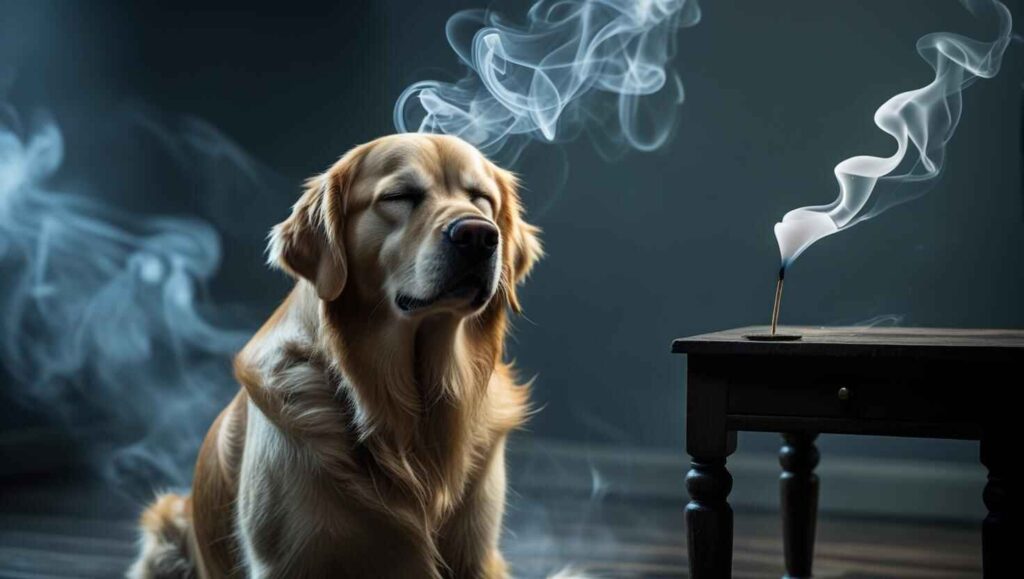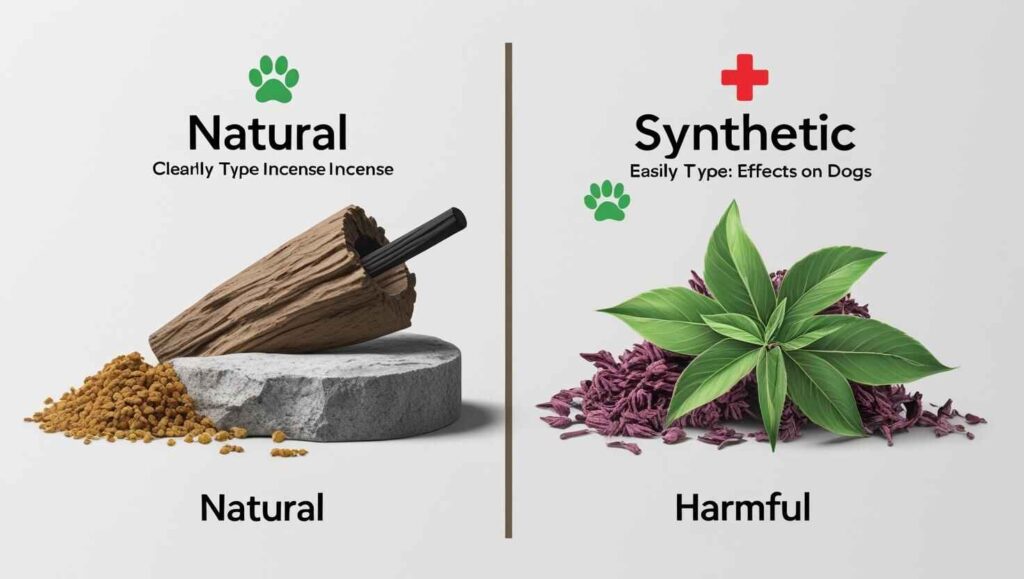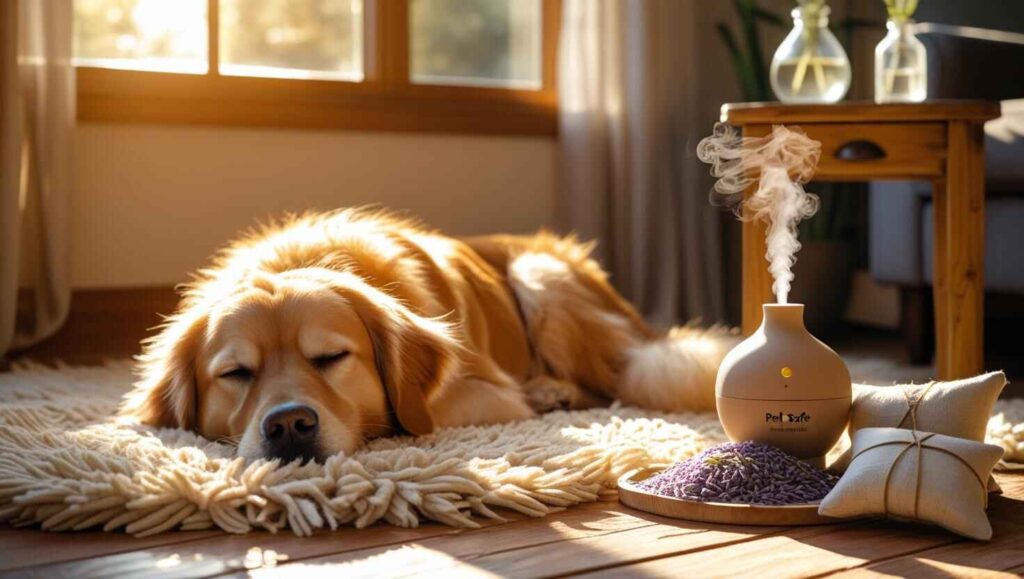🪔 Understanding What Incense Is
Incense is a mixture of aromatic plant materials and essential oils, commonly used in many households for religious, spiritual, or relaxation purposes. It typically comes in the form of sticks, cones, or coils that, when burned, release fragrant smoke.
🌿 Common Ingredients in Incense
Incense is made from a mix of different ingredients, which can vary quite a bit depending on the type and purpose.
- Resins: Like frankincense and myrrh
- Herbs: Such as sage, lavender, and sandalwood
- Essential oils: For fragrance and therapeutic effect
- Binders and accelerants: Sometimes synthetic, for stability
While these ingredients seem natural, some can be toxic to pets, especially when combusted.
🏠 How Incense Is Used in Homes
Incense is usually burned for:
- Religious rituals
- Meditation or yoga practices
- Removing bad odors
- Creating a peaceful ambiance
However, burning incense indoors poses a potential health hazard to dogs due to their sensitive respiratory systems.
🐶 Can Dogs Smell Incense Differently Than Humans?
Absolutely! Dogs have an incredibly powerful sense of smell—around 40 times more sensitive than what we humans experience. While a subtle scent may seem pleasant to you, it might be overwhelming—even painful—for your pup.
👃 Dog Olfactory Sensitivity Explained
Dogs have over 300 million scent receptors in their noses, compared to 5–6 million in humans. This makes them incredibly sensitive to airborne particles, including smoke and fragrances.
😖 Why Scented Products May Be Overwhelming for Dogs
What smells “relaxing” to you might cause:
- Disorientation
- Sneezing
- Head-shaking
- Avoidant behavior
Especially in small dog breeds or dogs with pre-existing health issues, even short exposure to incense can be distressing.
⚖️ Pros and Cons of Burning Incense Around Dogs
Let’s break down the pros and cons of incense exposure for dogs:
✅ Pros: Calming Effects (For Humans)
- Helps you relax, which can indirectly affect your dog positively
- Used for spiritual or cultural reasons
- Temporarily removes bad odors
However, the benefits don’t extend to dogs directly—they often pay the price for our peace.
❌ Cons: Respiratory and Neurological Risks
- Smoke inhalation can cause coughing or wheezing
- May trigger seizures in dogs with neurological sensitivities
- Can worsen existing respiratory conditions, like collapsed trachea
- Contains toxic compounds, such as benzene or toluene
Important: Dogs can’t verbally express discomfort, so symptoms often go unnoticed until they become serious.
🚨 5 Harmful Effects of Incense Smoke on Dogs
Here are the most documented ways incense can affect canine health:

1️⃣ Respiratory Irritation and Coughing
Breathing in incense smoke can irritate your dog’s airways and cause problems like:
- Coughing
- Sneezing
- Shortness of breath
Especially harmful to puppies, seniors, and brachycephalic breeds (e.g., pugs, bulldogs).
2️⃣ Worsening Asthma or Allergies
Dogs with allergies may show increased symptoms when exposed to incense:
- Itchy skin
- Red eyes
- Ear infections
- Reverse sneezing
3️⃣ Toxic Ingredient Inhalation
Burning incense releases:
- Carbon monoxide
- Formaldehyde
- Polycyclic aromatic hydrocarbons (PAHs)
These substances can cause organ damage over time with chronic exposure.
4️⃣ Eye and Skin Irritation
The smoke and chemicals can irritate:
- The eyes, leading to excessive tearing or squinting
- The skin, especially in sensitive breeds
5️⃣ Behavioral Changes Due to Discomfort
Some dogs may become:
- Restless
- Anxious
- Aggressive
- Depressed
This can be a reaction to unidentified stress from the smell or sensation of the smoke.
🕯️ Are Certain Types of Incense Safer for Dogs?

🧪 Natural vs Synthetic Incense
- Natural incense (without dyes or synthetic scents) may be less harmful but still not entirely safe.
- Synthetic incense often includes chemical stabilizers and heavy perfumes, which are worse for pets.
🌺 Scented Oils, Resins, and Their Impact
- Some essential oils (like eucalyptus, tea tree, or cinnamon) are toxic to dogs even in low quantities.
- Frankincense and myrrh—while considered sacred—can cause irritation when burned.
Always check whether the base ingredients are dog-safe—both burned and unburned.
🛡️ Tips for Using Incense Safely Around Dogs
💨 Ventilation and Placement
- Burn incense near open windows or exhaust fans
- Keep dogs in a separate, well-ventilated room
- Avoid burning incense at dog level (tables, floors)
⏱️ Timing and Supervision
- Don’t leave incense burning unattended
- Limit burn time to 15–20 minutes
- Watch your dog for signs of distress: drooling, wheezing, pacing
🍃 Alternatives to Incense That Are Pet-Friendly

🌬️ Essential Oil Diffusers (Pet-Safe Oils)
Some essential oils are safer when used in well-diluted form:
- Lavender (in moderation)
- Chamomile
- Ginger
Just a quick tip—it’s always best to check with your vet before using any scented products around your dog.
🌿 Natural Air Fresheners and Herbal Sachets
- Baking soda bowls to neutralize odor
- Activated charcoal
- Homemade herbal sachets (lavender, mint—not toxic varieties)
These options help keep your home fresh without endangering your dog.
❓ FAQs
Q1: Can incense cause seizures in dogs?
Yes. Some ingredients in incense, especially synthetic fragrances, have been linked to neurological symptoms like tremors or seizures in sensitive dogs.
Q2: What are signs that incense is affecting my dog?
Watch for:
Coughing
Hiding or avoiding rooms
Red eyes or runny nose
Unusual lethargy
Q3: Can puppies tolerate incense better than older dogs?
No. Puppies have delicate lungs and are often more vulnerable to respiratory irritants than adult dogs.
Q4: How long after burning incense can I bring my dog into the room?
Wait at least 30 minutes after burning incense, and ensure the room is well-ventilated before reintroducing your pet.
Q5: Is incense worse than candles for dogs?
Yes. Incense produces smoke and particulate matter that are more harmful than most unscented candles.
Q6: Are there incense brands that claim to be pet-safe?
Some brands market themselves as “natural” or “pet-safe,” but no incense is completely safe to burn around pets due to the combustion process itself.
🐾 Conclusion: Should You Use Incense Around Dogs?
While incense may offer spiritual or aromatic benefits for humans, it poses real risks to your dog’s health. From respiratory issues to behavioral changes, even occasional exposure can be harmful over time.
If you choose to use incense:
- Keep your dog in a separate room
- Ventilate your home thoroughly
- Use it sparingly and never leave it unattended
Better yet, switch to pet-safe alternatives that bring peace to your home—without sacrificing your dog’s health.
Your dog’s nose is their superpower. Let’s keep it safe.
#.you may also like:



